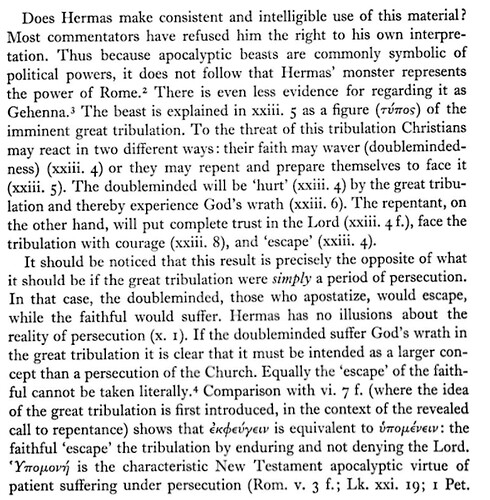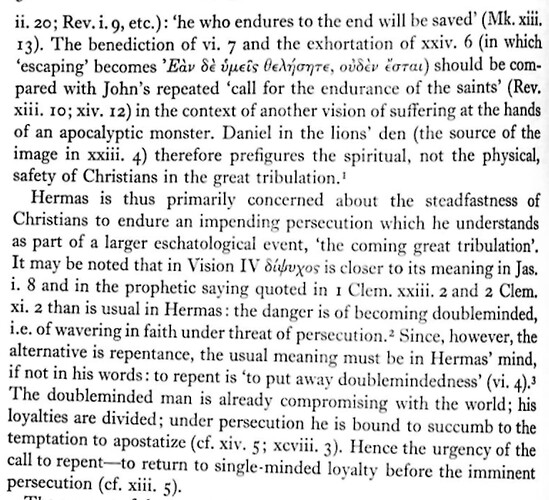To continue the conversation from this post,
Ice writes,
Furthermore, The Shepherd of Hermas speaks of the pretribulational concept of escaping the tribulation.
You have escaped from great tribulation on account of your faith, and because you did not doubt in the presence of such a beast. Therefore, go, tell the elect of the Lord His mighty deeds, and tell them that this beast is a type of the great tribulation that is coming. If you prepare yourselves, repent with all your heart, and turn to the Lord, it will be possible for you to escape it, if your heart is pure and spotless, and you spend the rest of your life in serving the Lord blamelessly.
Going back to the start of Vision 4, Chapter 1, in The Shepherd of Hermas, we read:
Twenty days after the former vision I saw another vision, brethren — a representation of the tribulation that is to come. I was going to a country house along the Campanian road.
In other words, this section does not discuss Scripture but someone’s vision.
Now let’s look at all of “Chapter 2”:
Now after I had passed by the wild beast, and had moved forward about thirty feet, lo! A virgin meets me, adorned as if she were proceeding from the bridal chamber, clothed entirely in white, and with white sandals, and veiled up to her forehead, and her head was covered by a hood. And she had white hair. I knew from my former visions that this was the Church, and I became more joyful. She saluted me, and said, Hail, O man! And I returned her salutation, and said, Lady, hail! And she answered, and said to me, Has nothing crossed your path? I say, I was met by a beast of such a size that it could destroy peoples, but through the power of the Lord and His great mercy I escaped from it. Well did you escape from it, says she, because you cast your care on God, and opened your heart to the Lord, believing that you can be saved by no other than by His great and glorious name. On this account the Lord has sent His angel, who has rule over the beasts, and whose name is Thegri, and has shut up its mouth, so that it cannot tear you. You have escaped from great tribulation on account of your faith, and because you did not doubt in the presence of such a beast. Therefore, go, tell the elect of the Lord His mighty deeds, and tell them that this beast is a type of the great tribulation that is coming. If you prepare yourselves, repent with all your heart, and turn to the Lord, it will be possible for you to escape it, if your heart is pure and spotless, and you spend the rest of your life in serving the Lord blamelessly. Cast your cares upon the Lord, and He will direct them. Trust the Lord, you who doubt, for He is all-powerful, and can turn His anger away from you, and send scourges on the doubters. Woe to those who hear these words, and despise them: better were it for them not to have been born. Matthew 26:24
According to his visions, he sees a woman who represents the church. He tells her about meeting a beast and escaping this tribulation because of God’s power. The woman explains, ‘You escaped from this great tribulation because of your faith. Therefore, you should tell the church that they also can escape the tribulation they will face if they spend the rest of their days serving the Lord.’
In context, it’s hard to see how this references a future church escaping a tribulation because Jesus will rapture them beforehand.
Another resource on The Shepherd of Hermas is Dr. Richard Bauckham’s studies. His article, “The Great Tribulation in The Shepherd of Hermas” situates this writing within the context of early Christian apocalyptic. Here are some of the relevant sections for our discussion:
…
The main point here is that ‘escape’ refers not to a rapture but to remaining faithful to God in the midst of suffering under persecution.
So as I look at The Shepherd of Hermas, this theme runs throughout: the author and his church are enduring tribulation - and expect more in the future - and are trusting in Jesus to deliver them from their trials.


